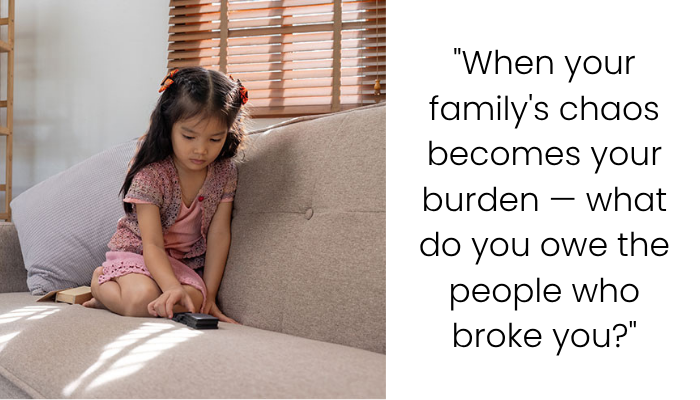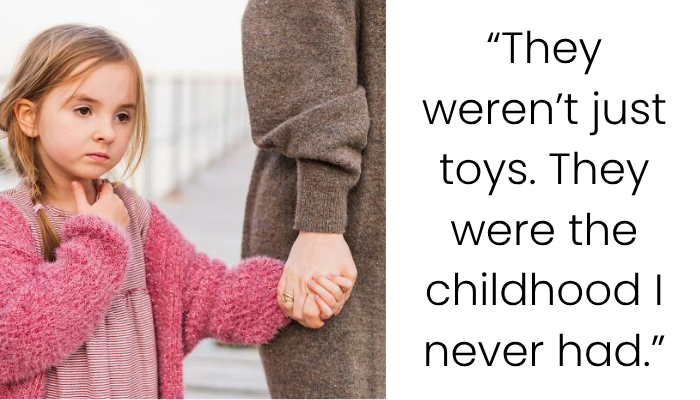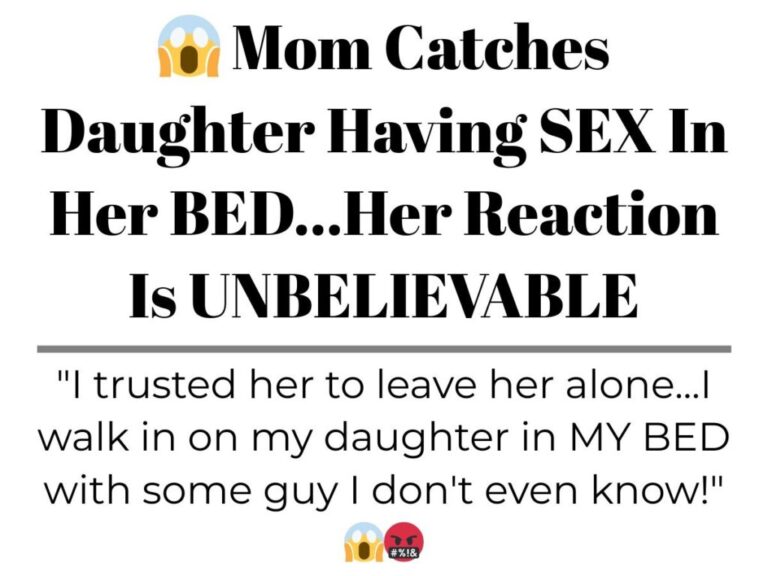My Brother Called CPS on My Sister — I Took Her Side and Now I’m the Villain
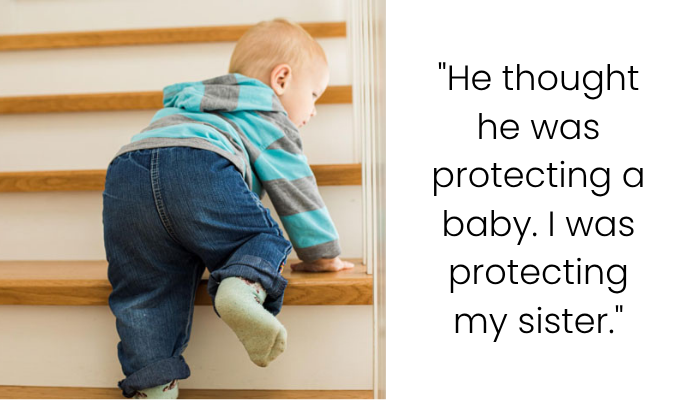
In this emotionally charged family conflict, the poster finds themselves in a difficult position between two siblings. Their sister, a new mother who recently left a troubled relationship, moved into the poster’s home with her newborn. Due to ongoing renovations, the house’s loft lacks a railing, though access is securely blocked with a puppy gate—an area clearly inaccessible to a three-week-old infant. When their brother visited and saw the setup, he became alarmed and, instead of expressing further concern directly, reported the situation to Child Protective Services (CPS).
While CPS ultimately found no cause for alarm and dismissed the case, the fallout was significant. The sister is understandably upset, fearing the report could negatively affect future custody proceedings with her ex. The brother, however, insists he acted in the child’s best interest and is frustrated at being cut off. Their father agrees, saying if there’s nothing to hide, there’s no harm in being investigated. The poster, caught between loyalty and logic, chose to support their sister, but now questions if they’re wrong for turning their back on their brother, too.
Advertisement – Continue Reading Below
CPS gets millions of reports every year, but this person’s brother thought it would be a good idea to add to their workload by filing a misleading claim
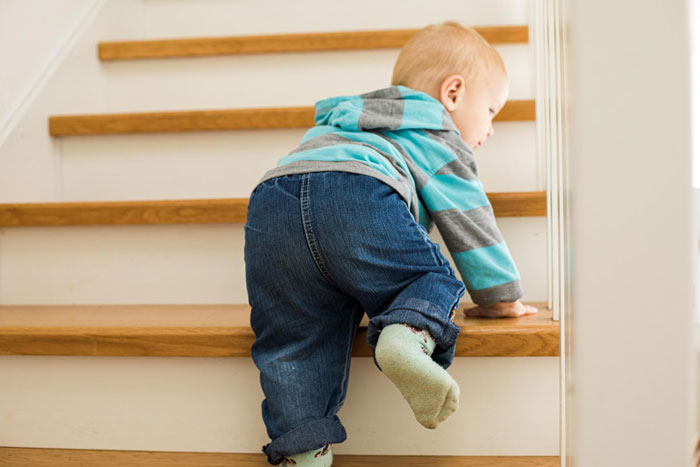
Advertisement – Continue Reading Below
When he came round to visit his sister, he had a total freakout about their loft being “unsafe” for her newborn baby

Advertisement – Continue Reading Below

Advertisement – Continue Reading Below

Advertisement – Continue Reading Below

Advertisement – Continue Reading Below

Advertisement – Continue Reading Below

Advertisement – Continue Reading Below

Advertisement – Continue Reading Below
Family, Allegations, and the Heavy Toll of a CPS Report
When a family member calls Child Protective Services (CPS), it’s more than a simple expression of concern—it’s a formal accusation that carries emotional, legal, and psychological consequences. Even if the claims are unfounded, the investigation process can be deeply distressing, especially for new parents navigating sensitive postnatal environments. This story highlights the difficult question of when concern crosses into overreach—and who bears the burden of such actions.

Advertisement – Continue Reading Below
The Power and Consequence of Mandated Reporting
It’s important to clarify that while healthcare professionals, teachers, and some social workers are mandated reporters legally required to report suspected child abuse or neglect, everyday individuals are generally not obligated by law to do so unless they’re in one of those roles. That doesn’t make reports from non-mandated individuals invalid, but it does reframe the brother’s actions. He was not required to report—he chose to. That choice, whether driven by sincere fear or misplaced judgment, comes with responsibility.
While CPS dismissed the case, its mere existence can be problematic, especially in potential future custody battles. Even unsubstantiated reports can be documented in court and weaponized by an opposing party, particularly when the report is publicly recorded or revealed during discovery. According to the American Bar Association, “Unfounded reports can be used to imply instability or poor judgment, even if officially dismissed.”
False or Unnecessary Reporting as a Form of Control
Advertisement – Continue Reading Below
False or exaggerated CPS reports are not just annoying—they can be traumatic. A 2020 study published in Child Abuse & Neglect journal notes that parents who undergo unwarranted investigations often experience high levels of stress, fear, and stigma, even when cleared. The process often includes home inspections, interviews, and sometimes follow-ups, which can feel like an invasion of privacy.
What’s worse, these types of reports can be used, intentionally or not, as forms of familial control. In this story, the brother’s justification is that he “was doing what was best” for the baby, despite the clear precautions in place and the explanations offered. This act undermines the sister’s parental competency and erodes the trust within the family. Even if well-intentioned, the failure to communicate further before escalating to CPS shows a serious lack of respect—and potentially a need to exert power in a situation where he felt out of control.
Sibling Loyalty and the Ethics of Taking Sides
The poster’s dilemma is relatable: When two people you love are in conflict, taking sides can feel like betrayal. But neutrality is not always noble—especially when one party has clearly caused harm. Supporting the sister isn’t just a matter of family bias; it’s an affirmation of trust and a rejection of needlessly punitive behavior.
Philosopher Judith Jarvis Thomson’s work on moral philosophy touches on the concept of “reasonable doubt” in moral accusations. In this case, there wasn’t even a clear danger—only perceived potential risk in a scenario where a newborn couldn’t physically access the loft. This suggests that the brother’s actions were more reactive than rational, perhaps emotionally driven rather than logically grounded.
Advertisement – Continue Reading Below
Family Systems Theory: The Role of the Enabler
The father’s comment—that “if there’s nothing to hide, there’s nothing to fear”—reflects a common but flawed understanding of child welfare investigations. His stance minimizes the impact of the accusation and subtly endorses the brother’s behavior. According to Family Systems Theory, such roles—where one family member (in this case, the father) enables or excuses the overreach of another—can perpetuate dysfunction. This often leads to alienation of the injured party (the sister) and places unfair emotional labor on neutral parties (the poster).
In fact, siding with neutrality or “logic” when one party has faced direct consequences is often a way of avoiding the discomfort of taking moral responsibility. In this situation, the poster’s support of their sister isn’t about “hating” the brother; it’s about recognizing that his actions had very real consequences and breached the trust necessary for healthy family dynamics.
Advertisement – Continue Reading Below

Advertisement – Continue Reading Below
Repair and Reconciliation: Is It Possible?
So where does the family go from here? Repair is possible—but only if there’s accountability. The brother would need to express genuine remorse for the method he used, not just defend the intention behind it. A conversation that acknowledges the emotional toll his actions took—and a recognition that future concerns should be communicated before involving external authorities—could go a long way.
The sister’s boundaries are also valid. Cutting him off, at least temporarily, is not a punishment—it’s a protective act, especially as she’s navigating a fragile legal and emotional landscape with her ex. Her choice to keep her child away from someone who reported her—even wrongly—reflects a need for emotional safety, not vindictiveness.
Advertisement – Continue Reading Below
When the Middle Ground is a Choice, Not a Duty
Finally, to the poster’s central question: Are they the a-hole for backing their sister? In a word: no. Loyalty to family is not just about blood—it’s about trust, shared values, and acknowledging when harm has been done. Supporting someone who was wrongly reported to CPS is not “irrational,” it’s a principled stand against overreach and fear-based interventions.
Sometimes, choosing a side isn’t divisive—it’s healing. And in this case, standing by the sister is the clearest expression of love and solidarity possible.
In the comments, readers swiftly concluded that the original poster was not being a jerk and slammed the brother for weaponizing CPS

Advertisement – Continue Reading Below

Advertisement – Continue Reading Below

Advertisement – Continue Reading Below

Advertisement – Continue Reading Below

Advertisement – Continue Reading Below

Advertisement – Continue Reading Below
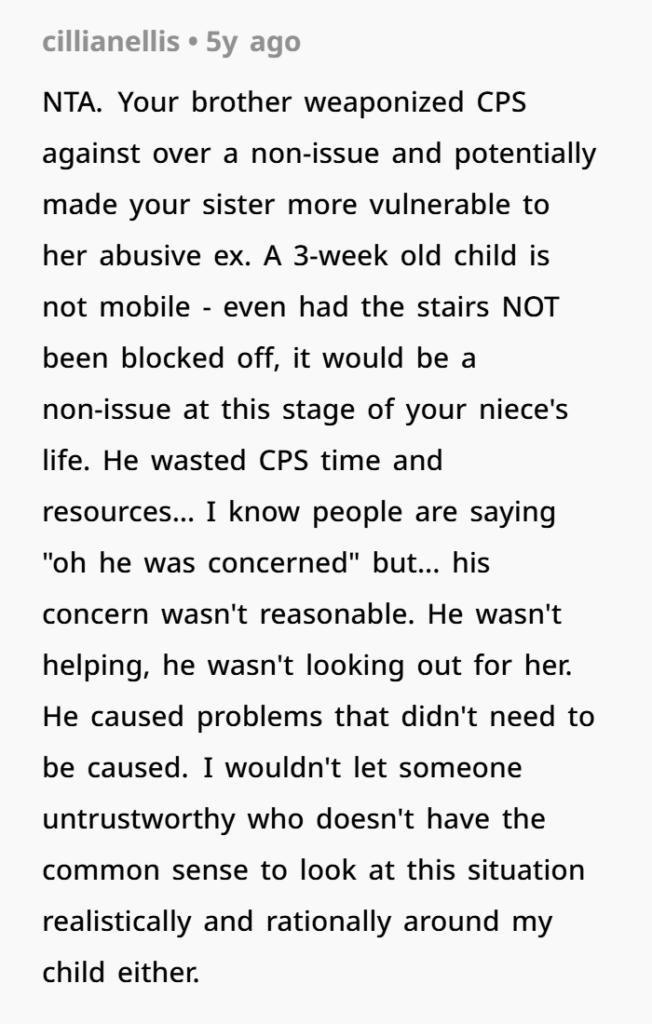
Advertisement – Continue Reading Below
Advertisement – Continue Reading Below



